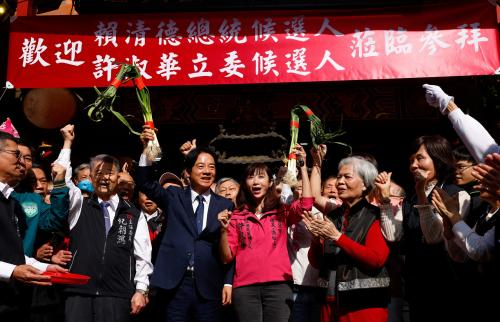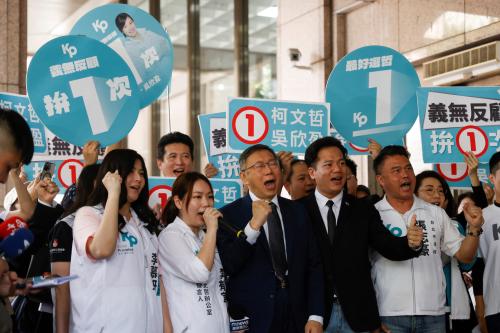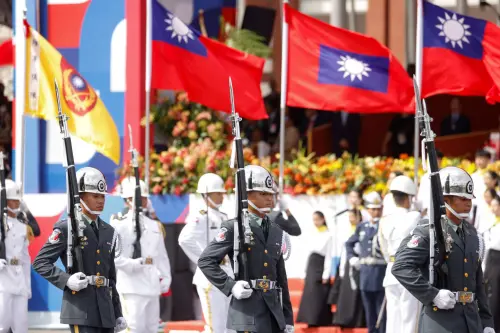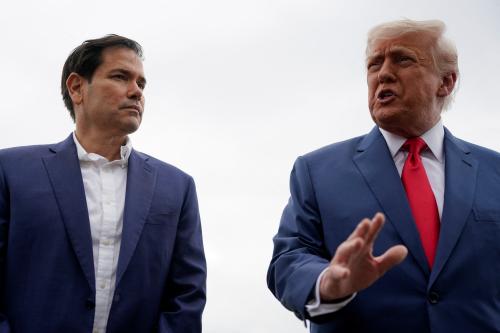In a closely watched election, Taiwan’s voters elected Democratic Progressive Party (DPP) presidential candidate and current Vice President Lai Ching-te over Hou Yu-ih of the Kuomintang (KMT) and Ko Wen-je of Taiwan People’s Party (TPP) on January 13, 2024. In the legislature, no political party gained an outright majority. Brookings scholars assess the Taiwan election results and what they mean for the island, cross-Strait relations, and the U.S.-China-Taiwan triangle in 2024 and beyond.
Richard C. Bush
The votes have been cast and counted. Lai Ching-te will succeed Tsai Ing-wen as president, but he won only 40.05% of the vote in a three-person race. No party won a majority in the 113-seat Legislative Yuan. The KMT won 52 seats and can count on the support of two independents, while the DPP got 51 seats. Ko Wen-je’s TPP received eight seats.
Taiwan’s political system will be more fragmented than it has been since 2008. Governance will be complicated. If elected officials are going to perform well, they will have to work together, despite party differences.
The legislature math is tricky. Fifty-seven votes are needed for a majority. The KMT and the DPP can each achieve that if and only if they are able to add the TPP’s eight seats. This will give the TPP and Ko significant bargaining power vis-à-vis the KMT and the DPP.
If this divided government is to be successful, negotiations between the executive and the legislature and among the parties in the legislature will be required. The government budget must be passed every year. Challenges loom on elder care, energy policy, the distribution of the benefits of economic growth, and policy toward China. Fortunately, Taiwan politicians had experience before 2008 in working out legislative compromises, where no party gets all it wants but society gets the policies it needs. Those bargaining skills will now be at a premium.
Ryan Hass
Beware media commentaries warning of the rising risk of cross-Strait conflict due to Taiwan’s January 13 election results. While it is true that Beijing would have preferred a different outcome than Lai Ching-te’s election, that fact alone does not raise the risk of war.
Some analysts will argue that the DPP’s control of the presidency for a third consecutive term proves the bankruptcy of Beijing’s approach and shows Beijing will need to turn to more militarily coercive tactics to achieve its aims. Such arguments underweight President Xi Jinping’s risk/benefit calculus.
Xi does not need to gain control of Taiwan in the near term, he just cannot afford to permanently “lose” Taiwan on his watch. He needs to continue to be able to call unification with Taiwan a “historic inevitability,” just like every People’s Republic of China leader before him.
The results of the election provide a soothing set of facts for Xi that all is not lost. This election showed that an overwhelming majority of Taiwan’s people prefer to preserve the status quo.
Furthermore, Lai won the presidency with less than 50% of the vote — 40.05% to be exact. This is the lowest percentage for a winning candidate since 2000. In addition, Lai’s political party did not retain control of Taiwan’s legislature. In other words, Lai does not have a mandate to alter Taiwan’s status, and his political party is not positioned to deliver such an outcome.
Xi also has his plate full at home with a softening economy, record youth unemployment, and deep-rooted corruption inside his military.
None of these factors foreclose the risk of conflict — a risk that is above zero. But taken together, these factors should sober anyone from drawing snap judgments that Lai’s victory materially raises the risk of near-term conflict. It does not.
Patricia M. Kim
The Taiwan elections have concluded successfully with a plurality of voters ignoring Beijing’s warnings and electing Vice President Lai Ching-te as their next president. If there’s one clear consensus that this election revealed, it’s the fact that the people of Taiwan are overwhelmingly in favor of maintaining the cross-Strait status quo, as reflected in the campaign platforms of all three candidates.
In the weeks leading up to the elections, Beijing intervened in expected ways — sending military aircraft, ships, and balloons across the Taiwan Strait, and discrediting Lai as a “destroyer of peace.” But its reactions thus far have been muted compared to the massive live-fire drills it conducted following U.S. House Speaker Nancy Pelosi’s visit to the island in August 2022.
U.S. actions around the elections were disciplined and calibrated to signal both resolve and reassurance to all parties. The Biden administration privately and publicly conveyed to Beijing that it opposes any outside interference in Taiwan’s elections, while also confirming U.S. policy on Taiwan remains unchanged. On Saturday, Secretary of State Antony Blinken congratulated Lai and the people of Taiwan, reconfirming the strong partnership between the people of Taiwan and the United States, and the U.S. commitment to cross-Strait peace and stability.
Of course, the question is whether the relative restraint can last. All sides understand that the current stabilization between the United States and China is fragile and could unravel at any moment.
In his victory speech, Lai affirmed his responsibility to protect cross-Strait peace and stability while indicating an openness to dialogue with China “under the principles of dignity and parity.” The ball is now in Beijing’s court to show the world that while it may not give up its claims and goals, it too can act judiciously and pragmatically in its pursuit of peace and stability.
Adam P. Liff
Last Saturday’s election witnessed the latest exercise of Taiwan’s vibrant and hard-won democracy under the shadow of continuing attempted intimidation from Beijing. It played out peacefully, transparently, and with enviable voter participation (about 72%) and efficiency (the losing presidential candidates conceded before 8:30 pm).
Beyond the obvious case of the election’s impact on cross-Strait vicissitudes, there are at least three other important spaces for U.S. policymakers to watch:
- Since the DPP returned to power in 2016, Beijing has induced over one-third of Taiwan’s remaining “diplomatic allies” to switch official recognition to the People’s Republic of China (PRC). Given Lai Ching-te’s victory, Beijing will continue this effort with the remainder, though how successful it will be — and with what big-picture consequences for Taiwan — remains uncertain. In this regard, Nauru’s decision just two days after the election to switch ties (again) is sobering. Only 12 remain.
- At the same time, the past eight years also witnessed a striking expansion of international support for Taiwan and its vibrant democracy from key U.S. allies and partners, including major powers and PRC trading partners such as Japan and the European Union. Expect Taiwan’s outreach to such “like-minded” democratic partners to continue under Lai and Vice President-elect Hsiao Bi-khim, both of whom have close ties to the United States and Japan, in particular. The successor to Tsai’s long-serving (retiring) foreign minister will have their work cut out for them.
- Lastly, legislative bargaining, including on defense-related spending and other matters of particular concern to Washington, will matter immensely. Last Saturday’s result means that the DPP (51 seats) will no longer enjoy the legislative upper hand that facilitated President Tsai Ing-wen’s agenda for the past eight years. With the KMT’s 52 seats also falling short of the 57-seat threshold, the far less well-known TPP (eight seats) will yield significant influence.
Syaru Shirley Lin
On January 13, 2024, the DPP’s Lai Ching-te and Bi-khim Hsiao were elected as Taiwan’s next president and vice president with a small 40% plurality. As expected, the DPP lost control of the legislature, holding on to only 51 of the total 113 seats, but no party gained a majority; the KMT won 52 seats, the TPP eight, and independent candidates two. This produced a limited presidential mandate and divided parliament, with profound implications for how Taiwan will negotiate with the United States and China.
Both opposition parties proposed closer economic ties with China. The DPP will propose more defense spending and deeper security ties with the United States. However, very little can be accomplished because the three parties disagree on these issues. The opposition parties also vowed to restart nuclear power generation, which the DPP has traditionally opposed. The generational divide is deep, as both the KMT and DPP appealed to older voters, while the TPP won backing from young supporters. Domestic issues such as high housing prices, energy security, wage stagnation, and healthcare reform may produce coalitions on an issue-specific basis, but we should expect a stalemate on foreign and cross-Strait policy. Beijing will continue to threaten Taipei militarily and diplomatically, although it will exercise restraint leading up to the U.S. presidential election. Meanwhile, the United States will continue to squeeze Taiwan on technology and defense. In short, Taiwan will have to navigate a dangerous world while plagued by internal division and a weak government.
Melanie W. Sisson
President-elect Lai Ching-te has promised to accelerate the Taiwan military’s transition away from concepts that support offshore, offensive operations and toward those more capable of slowing and imposing costs on Chinese forces in the event of an incursion. He also signaled an intent to raise Taiwan’s defense budget beyond current levels if elected. Some argue that in addition to strengthening Taiwan’s self-defense capabilities, such an increase also is needed to signal to the international community, and most especially to the United States, that the Taiwan people will resist if China attacks. This requires making tradeoffs between domestic and defense spending, and it asks the Taiwan people to take on faith that indicators of their own resolve will serve also to harden the resolve of their friends.
In a survey done during the summer of 2023, however, a majority of respondents said that Taiwan’s defense spending is already either about right (44.6%) or too much (35.48%). Another poll had a majority agreeing that the United States “will use force to help Taiwan if Beijing tries to unilaterally change the status quo” and that the United States is not a “trustworthy country.”
Both sentiments are consistent with “American skepticism,” the proposition that the United States regards Taiwan as a strategic asset in its competition with China. Neither, however, is conducive to making increases in the defense budget. If one believes the United States is likely to intervene because doing so serves its own interests, then larger military expenditures are unnecessary. If one believes the United States can’t be trusted anyway, then larger military expenditures intended to woo it are foolish. While these perceptions will not determine whether the defense budget will rise, they also won’t make achieving that outcome any easier.
Susan A. Thornton
The most important thing about any election is that it establishes legitimacy for the ruling authorities and gives them a mandate to carry out their policies. Vice President Lai Ching-te, the DPP candidate, got the most votes in what can only be described as a model free, fair, and open democratic process and he is to be congratulated. Given that the nature of the Taiwan political system is a first-past-the-post system and that there were three candidates running, however, Lai did not manage to gain the majority of votes cast. In addition, since the opposition party KMT gained the most seats in the legislature and the number three TPP gained a number of seats, the DPP will not control the legislature. This means that Lai will head a minority government. If he wants to move his agenda, he will need to pursue things that find support beyond the deep partisan political divide.
People on Taiwan are actually not so divided. They all want to live in basic security and tranquility, they want to enjoy their hard-earned freedoms, and they want their government to improve livelihoods, especially for the next generations, and to be accountable. They want their government to find a way to get along with their mainland neighbors to the extent that they can keep the status quo of separate rule with economic and cultural exchange. Perhaps Lai’s minority government now has an opportunity to move Taiwan politics toward greater unity and long-term vision. Will he seize it?
The Brookings Institution is committed to quality, independence, and impact.
We are supported by a diverse array of funders. In line with our values and policies, each Brookings publication represents the sole views of its author(s).














Commentary
The impact of Taiwan’s election in 2024 and beyond
Brookings experts weigh in
January 17, 2024